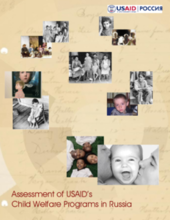The child welfare programs, funded by USAID in Russia, were designed to pilot, disseminate, and help institutionalize modern child welfare services, particularly, child abandonment prevention and professional support of vulnerable children, child welfare institutions, and substitute families. This report reviews program results and sets out recommendations for future program design. The programs that were evaluated have contributed to child welfare reforms by: designing and piloting a continuum of services that prevent child abandonment, neglect and abuse, and support children without parental care; expanding social work to the layer of child neglect and deprivation that was previously impenetrable to modern welfare interventions; creating a cohort of social workers who understand, believe in, and practice a pro-active approach to preventing child abandonment and neglect, and providing multi-disciplinary support to parents and children in substitute families; and contributing to the legislative and regulatory process in pilot regions to create an enabling environment for the new strategies and methods.

